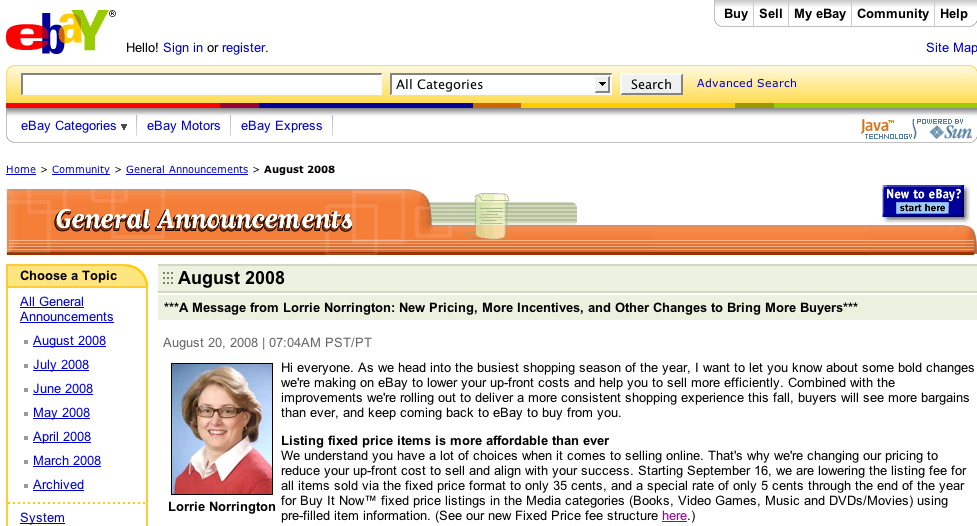eBay Slashes Fixed Price Listing Fees...<i>But Why?</i>
- by Michael Stillman

Ebay's Lorrie Norrington announces changes in fees for fixed price sales.
By Michael Stillman
Ebay has announced that it is slashing its charges, effective September 16, on fixed price listings. These are no small adjustments. In an August 20 posting on the eBay site, eBay Global Operations President Lorrie Norrington announced that the changes would amount to a 70% reduction in listing fees on "Buy It Now" items. Insertion fees, which previously ranged from $.35 for an item with a starting price under $10, to $4 for one with a starting price over $500, will now be $.35 regardless of price. The reduction on books listed is even greater. The previous range of $.25 to $4 is replaced with a flat $.15 regardless of starting price.
Ebay will take back some of that lost listing revenue after the sale. For books, the previous 8.75% commission on the first $50 will rise to 15%. For amounts between $50 and $1,000, the commission rises from 3.5% to 5%, while amounts over $1,000 rise from 1.5% to 2%. Interestingly, some items in the electronics area, particularly computers, will see reductions in both listing fees and commissions. Ebay evidently has concluded that this is an area where it must do a better job of competing. The commissions of 15%-5%-2% for books are but 6%-3.75%-1% for computers. Meanwhile, items not sold will continue to be free of any closing fees.
There is no corresponding reduction in charges on items sold in eBay's traditional manner - via auction. As Ms. Norrington says, "We believe this format is already a good deal, especially when you list with a low start price." In other words, eBay is making a major move to encourage more sellers to list at fixed prices.
Another change, one that should help eBay's revenue stream, is that they will no longer allow payment by check or money order. Payment must now be made electronically, with one of those options being PayPal, an eBay company which provides income to its parent. Additionally, starting November 1, in an attempt to increase buyer confidence, eBay will require sellers to maintain at least a 4.3 seller rating (DSR - Detailed Seller Rating). Ms. Norrington stated that "only a small fraction of sellers fall below this threshold."
Why has eBay initiated these price reductions? If you guess simple generosity, or an attempt to soothe sellers who have been upset by price increases in the past, you are probably wrong. Those most upset have generally been auction sellers, who do not benefit from these changes. Nor does it appear that this is a strategy of increasing sales volume so much as to outweigh the loss in fees. The cuts are too great to be explained this way, particularly since it is out of character with eBay's history of how to increase corporate revenue. The real explanation here appears to be Amazon, and a fear by the number one online retailer that number two is threatening to displace them. Amazon's revenues have been growing rapidly over the past year, while growth has been slowing at eBay.
Many analysts have attributed Amazon's more rapid growth to two factors: (1) shoppers like the ease and certainty of fixed price buying, and (2) they have more confidence buying from Amazon than from eBay's independent sellers. There is a bit of irony here in this explanation. It was just a couple of years ago that eBay's overwhelming strength in the auction sector chased Amazon out of that business. Meanwhile, Amazon has been expanding its offerings from independent sellers, even as it continues to stock and sell most of the merchandise it sells.
Nevertheless, eBay now sees its reputation as an auction company as a weakness, and is determined to place greater emphasis on being a more traditional online retailer (there's another irony - "traditional online retailer!"). Lower fees for fixed price listings should bring in more of this traditional type of sales. Meanwhile, eBay will be giving greater prominence to larger sellers with higher ratings, designed both to bring in more high volume merchants and reassure consumers they are buying from people they can trust.